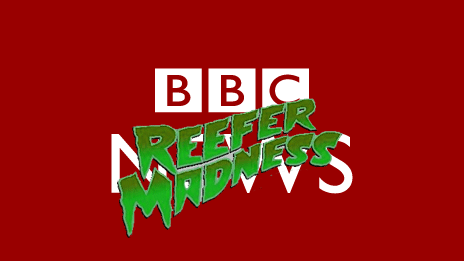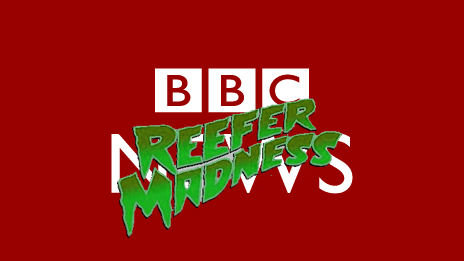BBC launch scare monger campaign against ‘skunk’ cannabis after ITV shows the true side and harm that current drug policy of prohibition itself is causing – rather than cannabis.
 In an article published online alongside a video filmed in Nottingham, aired on the 28th of October to promote BBC Inside Out, claims are made about the increased use of cannabis and concern expressed over the amount being smoked by young people. Here we have broken down each sentence that the BBC published and look over some of the blind-sighted statements made – or, for better use of a word, propaganda. It’s all bad, bad, bad, but not one mention of the medical side of cannabis. GW Pharmaceuticals are licensed to grow 300 tonnes a year.
In an article published online alongside a video filmed in Nottingham, aired on the 28th of October to promote BBC Inside Out, claims are made about the increased use of cannabis and concern expressed over the amount being smoked by young people. Here we have broken down each sentence that the BBC published and look over some of the blind-sighted statements made – or, for better use of a word, propaganda. It’s all bad, bad, bad, but not one mention of the medical side of cannabis. GW Pharmaceuticals are licensed to grow 300 tonnes a year.
Dangers of skunk must be reinforced warn health experts
28 October 2013 Last updated at 13:33 GMT
- Skunk is the strong form of cannabis, high in the chemical THC, which has become increasingly popular with UK drug users.
Very true, “Skunk” is pretty much the British word for Sensimillia “cannabis without seed”. This means it produces more resin as it doesn’t have to put energy into reproducing seed. Not many people like smoking cannabis with seeds in. It’s oily, crackles, tastes and feels harsher to smoke – not to mention more harmful chemicals are inhaled when seeds are burned. There may be more ‘skunk’ on the market than regular, bush weed but that’s because people are making informed decisions and the market has adapted to that.
- The drug is known to increase the risk of anxiety and paranoia amongst those who smoke it, resulting in an increasing number of referrals for mental health treatment.
It would be beneficial to support statements like this with actual statistics rather than just making the claim and expecting your readership to just believe you – because you are the BBC and you work under a Royal Charter which means you have to be unbiased. If cannabis was sold under a regulated framework consumers would be able to choose the strength and level of CBD:THC ratio that their cannabis had rather than being left to the hands of dealers that just want the money and don’t are about any potential negative outcomes.
- The number of people in treatment for mental health problems after smoking cannabis has gone up by a third in the past six years in the UK.
Again, where are these figures coming from?
- David Manley from the Nottinghamshire Health Care NHS Trust says it is not unusual for him to meet young people who smoke 20-30 skunk joints each day.
Nottingham Council need to start providing more activities and better facilities for today’s youths. Young people typically get into drug habits when there is not much else to do to stimulate their minds. Invest in our youth and inspire their creative minds – don’t blame cannabis.
More worryingly it doesn’t take a GW Pharmaceuticals scientist to work out that smoking 20-30 joints a day would be a hell of a lot of cannabis. Where are all these youths getting it from? And how are they affording it? Quite simply – they aren’t (but don’t let the Tories make you think that it’s being paid for by benefit cheques)!
A 2013 study from the Centers for Disease Control in the United States found that a person with a mental illness was 70% more likely to smoke [tobacco] than a person without a mental disorder. Misdiagnosing cannabis use because of a raving nicotine addiction in an patient with an underlying mental health problem is not going to help them.
These youths quite clearly have a tobacco addiction (legally available – government sanctioned drug) as it has been culture in the UK to cut cannabis with tobacco. Why no one seems to batter an eye lid at the fact that some young people are smoking 30-40 cigarettes a day is beyond me. There is a legal age for buying tobacco in the UK and that is 18, only raised up from 16 in recent years. Teen use has been declining since 2006 and this is most likely due to sending out a stronger message by using Health Warning Labels and introducing the smoking ban in public and work places, rather than the threat of a criminal record as is the case with cannabis.

David Manley, according to the National Statistics on Smoking 2011 “Smoking was estimated to cost the NHS in the UK £5.2 billion in 2005/06” – I would be more worried about this.
“In 2010, it is estimated that almost one in five deaths in England of people over 35 years of age were due to smoking. Over a third of all deaths from respiratory diseases and almost three in ten of all deaths from cancers in this population are estimated to be caused by smoking. A higher proportion of smoking attributed deaths were seen for men (23%) compared to women (14%).”
Cannabis use has never resulted in death and even smoking cannabis (pure) has been shown to actually improve lung function and reduce cancer risks (Tashkin, et al, UCLA, 2005). Here is also an article by Pf. David Nutt outlining why the British Lung Foundations evidence against claiming cannabis is more harmful than tobacco is quite simply void of accuracy.
From my experience as a person that travels around to many parts of the UK I can say that enforcement of youth tobacco consumption has never entered my radar but the number of youths I have seen smoking cigarettes in town centres is always the same.
There is no legal age for buying cannabis because no ID is required as there are no controls over the black market drugs trade. If the claims that cannabis is so harmful were true – wouldn’t you expect them to introduce measures to stop young people being able to get hold of it?
- Peter Moyes, director of the Nottingham Crime and Drugs Partnership, wants a clearer message about the health dangers associated with skunk to be given to young people.
Stop lying to them and you might get a better response. Just a thought.
- Inside Out’s Sarah Sturdey meets two young adults called Jackson, 18, and Jacob, 20, from Nottingham who explain why they smoke skunk despite the warnings.
Well done to Jackson and Jacob for standing and representing cannabis consumers where it counts. Prefering cannabis to alcohol is not uncommon and when giving evidence to the Home Affairs Select Committee reviewing Drugs Policy, Pf David Nutt speaking for the Independent Scientific Council on Drugs, proposed that around 20% of people would switch to using cannabis from alcohol as their first choice of recreational drug were it to be legally regulated.
- Inside Out is broadcast on Monday, 28 October at 19:30 GMT on BBC One East Midlands and nationwide on the iPlayer for seven days thereafter.
Or you can watch it here:
Most of the points I have made all pretty much explain the same thing – people who use cannabis quite often do so by making an informed decision. As adults we have decided that 18 is the age when you are better at making informed decisions and your body is ready for you to put consciousness altering substances such as alcohol, nicotine and hopefully, sooner rather than later, cannabis. In the United States of America, Washington and Colorado have legalized and are regulating the sale of cannabis to 21 year olds and above (the same as their legal drinking age).
Why do the BBC fail to give an informed, rational and balanced account of an issue that has so much global attention currently? Are they just bad at reporting or is there more of an agenda here, only feeding their audience a specific agenda and bias?
What do you think of the BBCs coverage on cannabis? On teen cannabis use? On teen tobacco use? Leave your comments below.





Comments (13)